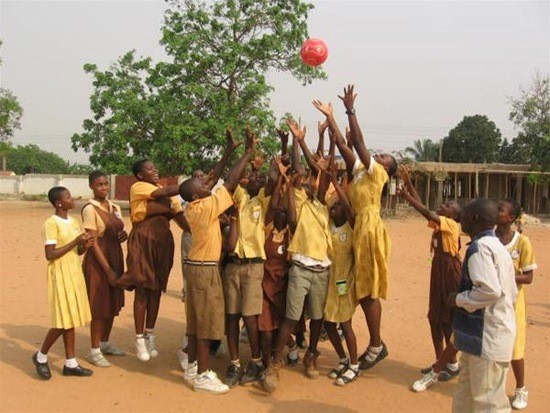
Right to Play: Sport and Play have the power to change every child’s life
In underprivileged communities affected by war, poverty and disease a healthy physical and emotional development of children is difficult. Sport and Play have an enormous power to build essential skills in children and thereby drive social change. RTP uses sport and play programs to teach life skills, health education and build stronger communities. To do this, RTP trains local coaches to run programs, thereby creating the foundation for long-term sport and play programming. On a weekly base RTP reaches 1 million children with the help of almost 13,500 local leaders and coaches and 6,300 Right To Play Junior Leaders..
Impact
Right To Play reaches 1 million children and youth through weekly sport and play activities with the help of nearly 13,500 Right To Play coaches and 6,300 Right To Play Junior Leaders. 49% of children participating are girls and more than 56 per cent of coaches are female.
Evaluations are providing evidence that Right To Play programs are having the desired effect. Some examples:
- Children and youth participating in Right To Play programs demonstrate improved life skills such as confidence, collaboration, empathy and communication.
- Children are more motivated to go to school, are more engaged in the classroom and have stronger academic performance than children who do not participate in Right To Play programs.
- Children and community members have improved knowledge of HIV and Aids resulting in a positive change in attitude towards people living with HIV and Aids.
A 2010 evaluation of Right To Play’s program in Liberia showed a significant improvement in the knowledge of HIV and Aids amongst children and community members, with a resulting positive change in attitude towards people living with HIV and Aids. The evaluation also revealed a significant reduction in violent conflict due to better conflict management skills imparted to children and community members.
Beneficiaries
The children and youth Right To Play works with have been seriously affected by conflict, poverty and disease. Our programs target the most marginalized individuals including girls, persons with disabilities, children affected by HIV and Aids, street children, former child combatants and refugees. Right To Play Coaches help not only to provide normalization to these children, by getting the children out and active but encourage behavior change through regular sport and play activities. To create change with a lasting and sustainable impact, Right To Play programs mobilize entire communities by cooperating and engaging with local organizations, parents, teachers, community members and volunteers.
Sustainability
Right To Play’s definition of sustainability centers on the capacity building of individuals, communities, partner organizations and local networks to independently deliver regular sport and play activities that have measurable development effects on children, youth and their communities. In order to ensure sustainability, the organization emphasizes the institutional capacity-building of both Right To Play itself and its partner organizations, within an enabling environment created through advocacy and awareness-raising work.
Innovation
Creative use of sport and play in reaching development objectives:
- Right To Play specially designed Program Resources that use sport and play as a tool for learning.
- The unique “Reflect-Connect-Apply” methodology integrated into all Right To Play Programs ensuring each game played by children enables learning and understanding.
- Right To Play’s delivery model that builds local capacity and sustainability.
Scalability
Right To Play developed a delivery model that is focused on local capacity building and is easily adapted whether we are working directly with communities, through schools or partner organizations. This delivery model integrating local staff and volunteers guarantees enhancement and continuance of the programs and drives a sustained change. Many children are reached increasing the impact of our work. Right To Play’s delivery model is based on the principle that each level acts as mentors and teachers to the level below (Program Coordinator > Supervisor > Coach Trainer > Coach > Children).
Source of funding
Right To Play funding comes from individuals and corporations (approx. 42%) and foundations (14%) as well as from various government partners and UN agencies (approx. 44%) such as from United Nations Children Fund (UNICEF); United Nations High Commissioner for Refugees (UNHCR), the Canadian International Development Agency ; the Netherlands Ministry of Foreign Affairs and the Norwegian Agency for Development Cooperation.
Moreover Right To Play is working in partnership with various National Ministries of Education. In Thailand, for example, we support the implementation of specially-designed tools to help teachers better evaluate children’s progress in the development of life skills; in Benin, we have contributed to the development and implementation of a national early childhood education curriculum; and in Rwanda, our Red Ball Child Play and Early Child Play manuals have been certified and approved for use in all schools. In Rwanda we also work with local experts and the Ministry of Education to contribute to a national physical education curriculum that has been rolled out nationwide in 2012.
Right To Play designs and develops program resources (specially-designed material that uses sport and play as a tool for learning). Our expert educators and experienced trainers put our programs into practice as they:
- Promote experiential learning and holistic development using sport and play, games and activities;
- Emphasize the Reflect-Connect-Apply learning methodology, which allows learners to examine their experiences, relate those experiences to what they already know, and apply the learning in their daily lives;
- Promote inclusion of children who may be marginalized for reasons of gender, religion, ability, ethnicity, disability, or social background.
These resources include a Trainer’s Manual for the training of Coaches and a Coach Manual which focuses on teaching and learning strategies, games and activities for children and youth.